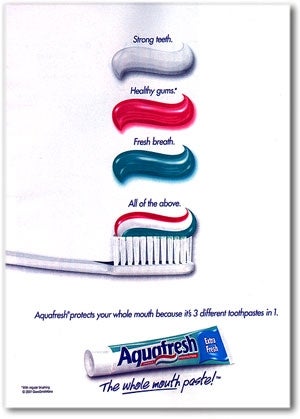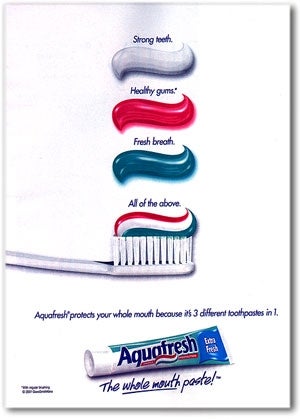PHILADELPHIA–Ushering in a new era of informed consumer purchasing, GlaxoSmithKline Monday unveiled an “advertisement,” a paid announcement designed to educate the public on which products will best serve its needs.

“Our first advertisement, or ’ad’ as we’ve come to call it, will soon appear in magazines across the nation,” GlaxoSmithKline CEO J.P. Garnier said. “Conceived as a service to our customers, this ad employs images and words to describe the benefits of using our Aquafresh toothpaste.”
The GlaxoSmithKline advertisement, provided free of charge to consumers, features a picture of Aquafresh and lists the benefits of its use: strong teeth, healthy gums, and fresh breath. It also explains how the product’s patented tri-color formula helps users reach these goals.
Though similar to public-service announcements, advertisements, Garnier explained, differ in that the featured product’s manufacturer pays the publication a fee to defray the cost of distribution. He predicted that ads will eventually appear in other media, from television to radio to large, free-standing signs posted next to roads.
Encouraged by the Aquafresh model, a number of major U.S. corporations, including McDonald’s, Alamo, and Foot Locker, are already developing their own advertisements.
“Finally, manufacturers will have an open forum in which to compare and contrast their products with those of competing manufacturers,” Pepsico vice-president Tina Grandelle said. “We’re currently developing an advertisement that would compare the attributes of Pepsi to those of Coke, so that a cola drinker could decide which beverage is the best choice for them. I must admit that, given all the facts, I am confident consumers will choose Pepsi.”
General Motors even plans to create a entire department whose sole purpose is to be a conduit of information from the company to the consumer.
“When we proposed creating a department dedicated to generating informational advertisements for our products, our board of directors was shocked,” GM CEO G. Richard Wagoner said. “Eventually, we were able to convince the board that this would be the perfect way to thank the citizens of this country for their years of loyal patronage.”
Companies are already considering a number of innovative techniques to get product information to the consumer. Television advertisements may contain what are essentially short plays depicting the benefits of using the product. Print advertisements may employ striking imagery to increase visual impact. Radio advertisements may use clever slogans and songs to deliver factual information in an easy-to-recall format.
Claire Recoy, a director of operations for Procter & Gamble’s Pert shampoo, said some advertisements could even contain scientific evidence backed up with easy-to-read charts, graphs, or illustrations.
“Someone shopping for shampoo will no longer have to blindly choose from rows and rows of bottles,” Recoy said. “They’ll be able to refer directly to the advertisements to find out which shampoos are designed to make hair stronger, silkier, bouncier, or more behaving.”
Recoy added that, while the same advertisements will appear repeatedly to ensure that all consumers have a chance to see them, new advertisements will be created frequently “so that consumers are guaranteed the most up-to-the-minute data on a particular product.”
Consumer-advocacy groups are hailing the creation of advertisements as a “huge step forward for consumers everywhere.”
“The introduction of advertisements represents a revolutionary shift, in which product manufacturing is based on the wants and needs of the purchasers,” said Dianne Lake, director of the D.C.-based Consumers Helping Others with Informed Choices Everywhere (CHOICE). “Consumers will be able to make informed decisions about what they buy, and manufacturers will have no option but to respond with the best possible product at the best possible price. If a product does not deliver on the promises made, consumers simply will not buy that product again.”
Continued Lake: “What a wonderful marketplace Americans will enjoy when all companies start providing this invaluable service.”







